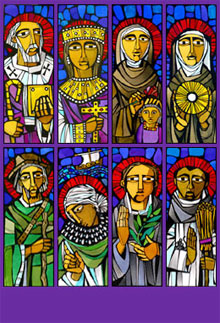 Even if you're a believer, you may think that the saints have nothing to do with your own life. You've no doubt read some of those gory stories of men and women having their eyes plucked out, or tongues cut out, or bodies devoured by lions in the Coliseum, not to mention stories of their being beheaded, drawn and quartered and so on. One of the most well-known icons in the Catholic Church is that of St. Lucy, the third-century martyr pictured holding her eyeballs on a silver platter, the symbol of her own gruesome end.
Even if you're a believer, you may think that the saints have nothing to do with your own life. You've no doubt read some of those gory stories of men and women having their eyes plucked out, or tongues cut out, or bodies devoured by lions in the Coliseum, not to mention stories of their being beheaded, drawn and quartered and so on. One of the most well-known icons in the Catholic Church is that of St. Lucy, the third-century martyr pictured holding her eyeballs on a silver platter, the symbol of her own gruesome end.
"Ugh," you might think. "I'm supposed to emulate that?"
If you're squeamish and can't bear to think of the sufferings that the martyrs endured for our faith (and I haven't even mentioned the fate of St. Jean de Brébeuf) you may instead think of saints who led ultra-pious lives, like St. Thérèse of Lisieux, the 19th-century Carmelite nun who refused to say a harsh word to anyone; or ultra-ascetic lives like St. Simon Stylites, the fifth-century Christian who lived atop a pillar for years on end; or ultra-active lives like Blessed Teresa of Calcutta aka Mother Teresa, who...well, you know what she did.
And you might still ask: What do all these hyperreligious lives have to do it me?
The short answer is: a lot.
When you read the complete stories of the lives of these saints, and shift your focus from the gruesome details of their martyrdoms and their more extreme ascetical practices, you will meet people who can teach you about being who you are. For each saint lived out his or her call to follow God in an individual way, tailored to their own personalities; and while some of aspects of their biographies seem odd to us today (like any life before, say, 1900 does), if you dig beneath the surface of their often-puzzling lives, you could find something that you might want to emulate: generosity, charity and love.
Their lives are far richer than tales of bloody deaths or overblown feats of prayer. They were human, after all, and had to face the same struggles we do. For example, they had difficulties with their families: St. Thomas Aquinas' family was so opposed to his entering the Dominican order in the 13th century that they locked him up in a jail. They suffered from physical ailments: St. Francis of Assisi spent a great deal of his later life battling terrible eye infections. And they faced difficulties from the religious organizations to which they belonged: St. Ignatius of Loyola, the 16th-century founder of the Jesuits, was several times thrown into jail by the Inquisition, which was suspicious of his ways of praying.
The saints were--and here is something we usually forget--human. ("Just like us," as the celebrity mags say about their subjects.) All of them tried the best they could to find a way to God during their own times, in their own circumstances and given their own limited worldviews. That goes a little way to explaining some of the practices that they undertook, which to our minds seem completely outlandish. St. Aloysius Gonzaga, a young 16th-century Jesuit, for example, maintained strict "custody of the eyes," which meant that he avoided looking women in the face to preserve his modesty.
Ridiculous? Of course. But it wasn't seen so in his time. Which begs the obvious question: What practices, religious or otherwise, of our time will look absurd in another 300 years?
Oh, really? Nothing you do is going to look silly, ridiculous or even offensive in 300 years? Don't be so sure. It's probably best not to dismiss a saint who, after all, was a creature of his time and place and of the mores of that time and place. Like we all are.
Read the rest on Huffpo.








If God sends you much suffering, it is a sure sign that He wishes to make you a great saint. If you desire to be a saint, then also desire to suffer much [Bart. 2:257].
St. Ignatius of Loyola
In 1903, young Angelo wrote in his spiritual journal: “From the saints I must take the substance, not the accidents of their virtues. I am not St. Aloysius, nor must I seek holiness in his particular way, but according to the requirements of my own nature, my own character and the different conditions of my life. I must not be the dry, bloodless reproduction of a model, however perfect. God desires us to follow the examples of the saints by absorbing the vital sap of their virtues and turning it into our own life-blood, adapting it to our own individual capacities and particular circumstances. If St. Aloysius had been as I am, he would have become holy in a different way” (Journal of a Soul)